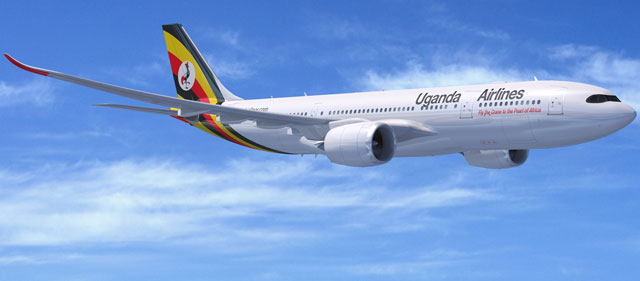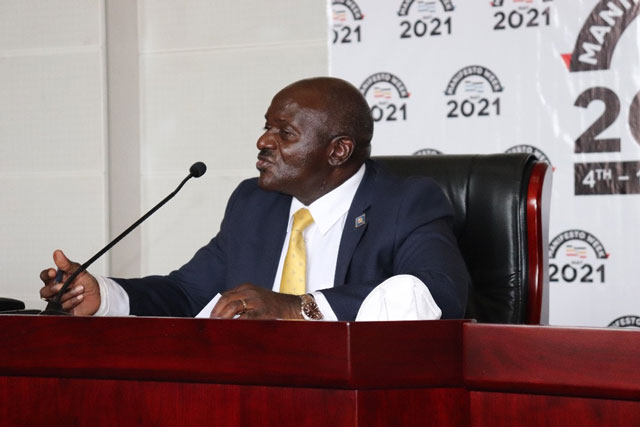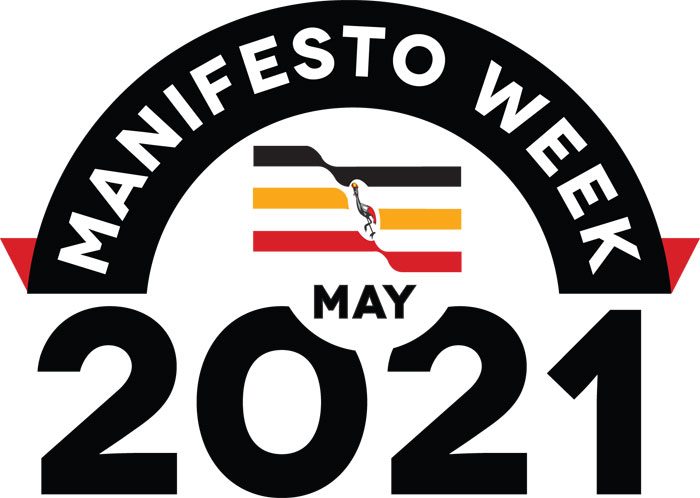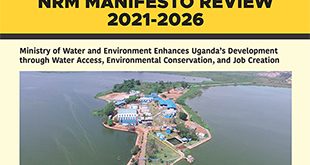
Katumba Wamala: Revival of Uganda Airlines is a pride of this country
NRM MANIFESTO WEEK | Ministry of Works and Transport is gearing up to deliver better transport experience to Ugandans. This is through efforts made and being made in the road, water, railway and air transport systems. According to Minister of Works and Transport, Gen. Edward Katumba Wamala, the sector achieved at 80% of the NRM manifesto commitments and strategic presidential directives and guidelines.
Gen. Katumba said this on May 7 while giving accountability of what the works and transport sector did between 2016 and 2021 elective term of office.
Over the last five years, the ministry has achieved a lot especially in the maintenance and construction of roads across the country. This is evidenced by the fact that one can travel from major border points on from Kampala all through on the tarmac roads. In the manifesto, the total cost of the commitments to the Works and Transport sector amounted to Sh37, trillion for the five years starting from 2016 to 2021. However, the Sector MTEF for the period 2016/17-2020/21 is Shs25.172 trillion, thus, there is a funding gap of Shs11.841 trillion.

By the end of five years at least 1,548km of newly paved roads were added to the national road network against the target of 2,025km. Better still over 15 road construction projects totaling 1000km are ongoing.
As regards to air transport Gen. Katumba said the revival of Uganda Airlines is a pride of this country noting that not even those talking ill about it.
“The negative talk about Uganda will not stop us from moving ahead. The airline is ready to support Uganda Airlines and it will continue to hover the skies. We will continue to support traders who want to trade across the world,” said Gen. Katumba.
In the air transport, there is an ongoing development of Kabaale International Airport which will be used to support the nascent oil and gas sector. Similarly, the expansion and rehabilitation of Entebbe International Airport is being done. Other airfields like Arua, Kasese, Kisoro, Gulu are being rehabilitated.
In the railway sub-sector, the government is working to ensure the Standard Gauge Railway is constructed. The key target on this project is securing the right of way. “We shall construct the standard gauge railway no matter what. We want to start when all dots have been cleared. We are ensuring that we have full control of the right of way. We are paying the project affected persons. Unlike road construction where the engineers can jump some patch of land as they wait for compensating the land owners, this is not the case with the railway construction. We need to have the line clear right from the start. We are ensuring we get the best cost, we doing the training of the people to construct the railway. We still discussing the financing arrangement from Exim bank,” says Gen. Katumba.

The ministry has plans to do the greater Kampala mass railway which will connect to Entebbe so that even those traveling to airport so that they are not delayed by road traffic.
In the meantime, the minister says the government is rehabilitating the meter gauge railway all the way from Kampala to Malaba. Port Bell Kampala route 9km is rehabilitated. Traders can now use this Southern route to connect to Mwanza port. Rail and water transport are the cheapest and good for trade.
In the water mode of transport, the ministry is constructing the new port at Bukasa. Land and road access have been acquired. The project affected persons (PAPs) of Bukasa have been compensated.
The minister also reported that MV pamba is being rehabilitated at Jinja and by July this year it will be up and running. Sukulu ferry has been commissioned.
The ministry is working with the International Maritime to ensure safety on water transport. “We don’t want to get another MV Templar experience,” said Gen. Katumba.
Regarding, policy and legal framework development, the government has enacted the tolling policy and this will start with the Kampala-Entebbe expressway. Also, the Roads Act was enacted as well as the revision of the Traffic and Road Safety Act whereby new driving licenses are now being issued by the Government of Uganda.
“I call upon all Ugandan drivers to get the new driving licenses as this process is faster. You can get driving licenses within 45 minutes if you have all the requirements,” Katumba said.
Challenges
The estimation of the Shs37 trillion in the last 5 years but only Shs 25 trillion was released. This was for the whole transport and works sector which was not enough. Other challenges include: erratic weather changes especially rains that have always been leaving a trail of destruction on roads, Covid-19 pandemic lockdown affected more the air transport more. Land acquisition is still challenging as well as the running costs and maintaining the road construction equipment is inadequate which places the acquired equipment at a disadvantage. Prolonged procurement delays which often result in administrative reviews, whistle blowers and court orders which delay the project implantation.
Contracts of road construction are not fair in aspects of local content development especially in a country is grappling with unemployment. Much as the contracts are won by foreigners there should be clauses and implementation of ensuring Ugandans benefit from them directly like supplying sand and labour. However, to support local content, projects of lower than Sh40 billion are ring-fenced for the local Ugandan construction companies.
Investing in road construction is very expensive and this makes it hard for the local construction companies not to favourably compete with foreign companies. To solve this there is need to have cheap money for credit.
Conclusion
The Ministry has to a great extent achieved the manifesto commitments despite the challenges. “In our estimation we have achieved 80% of the manifesto commitments and presidential directives as regards to Works and Transport sector,” said Gen. Katumba.
 The Independent Uganda: You get the Truth we Pay the Price
The Independent Uganda: You get the Truth we Pay the Price



